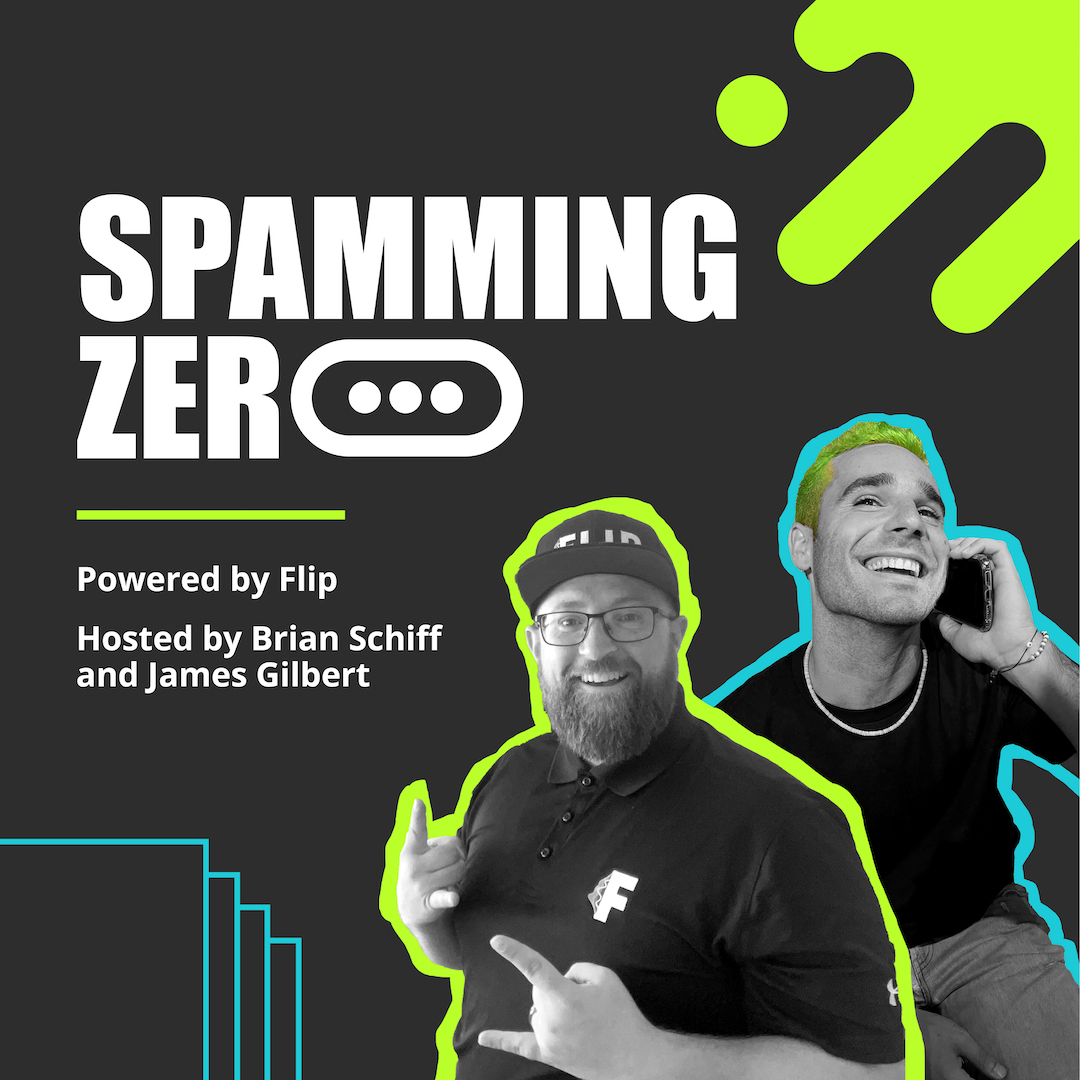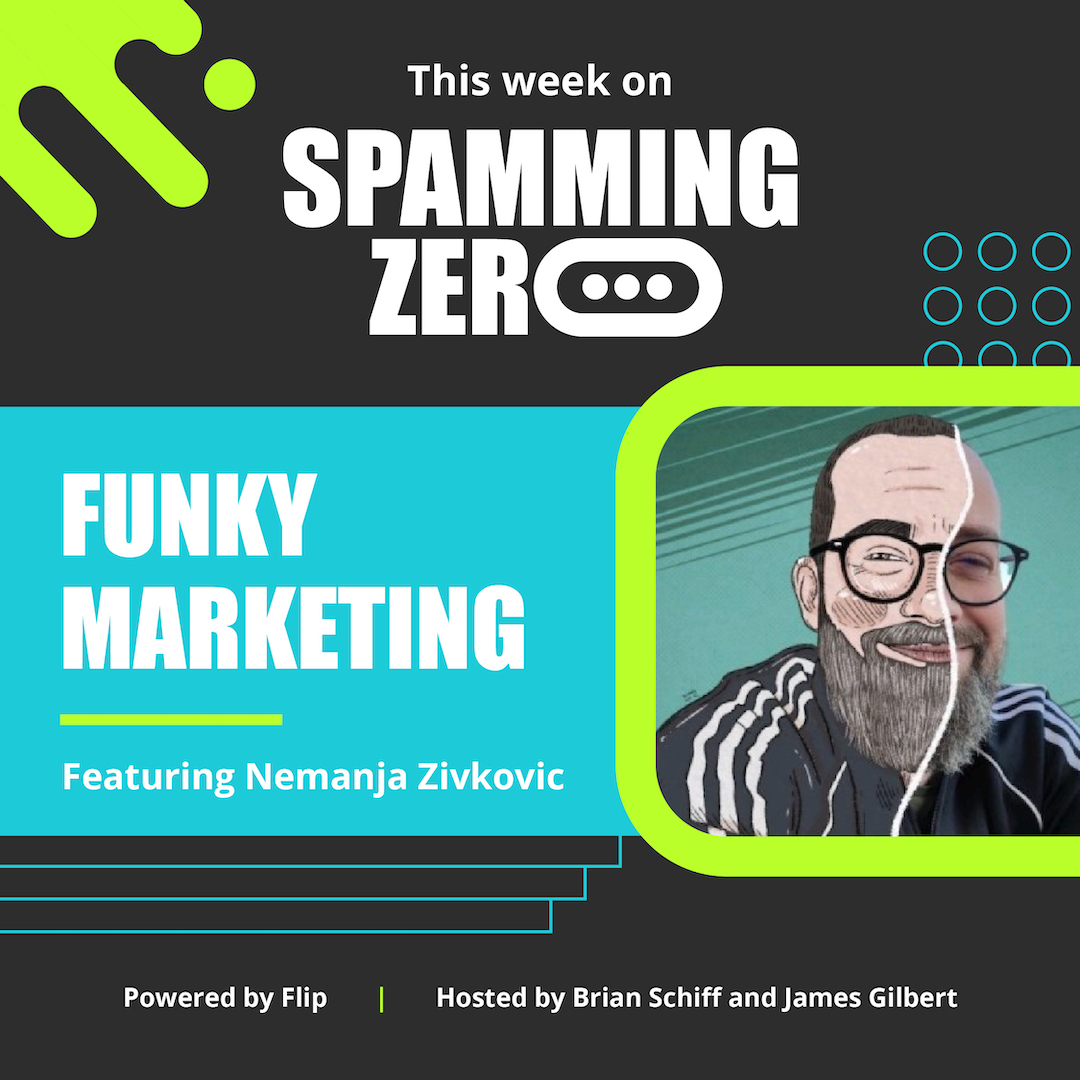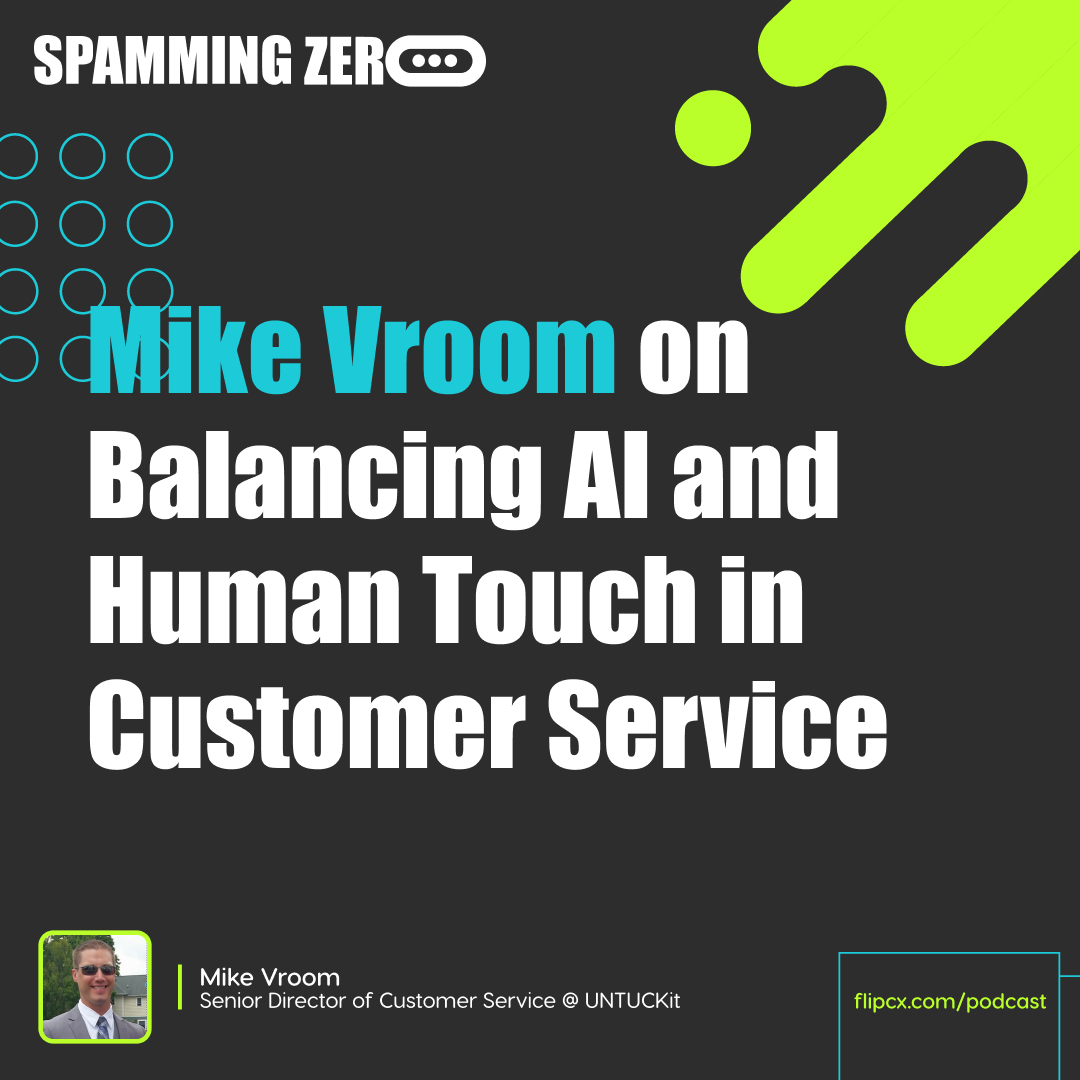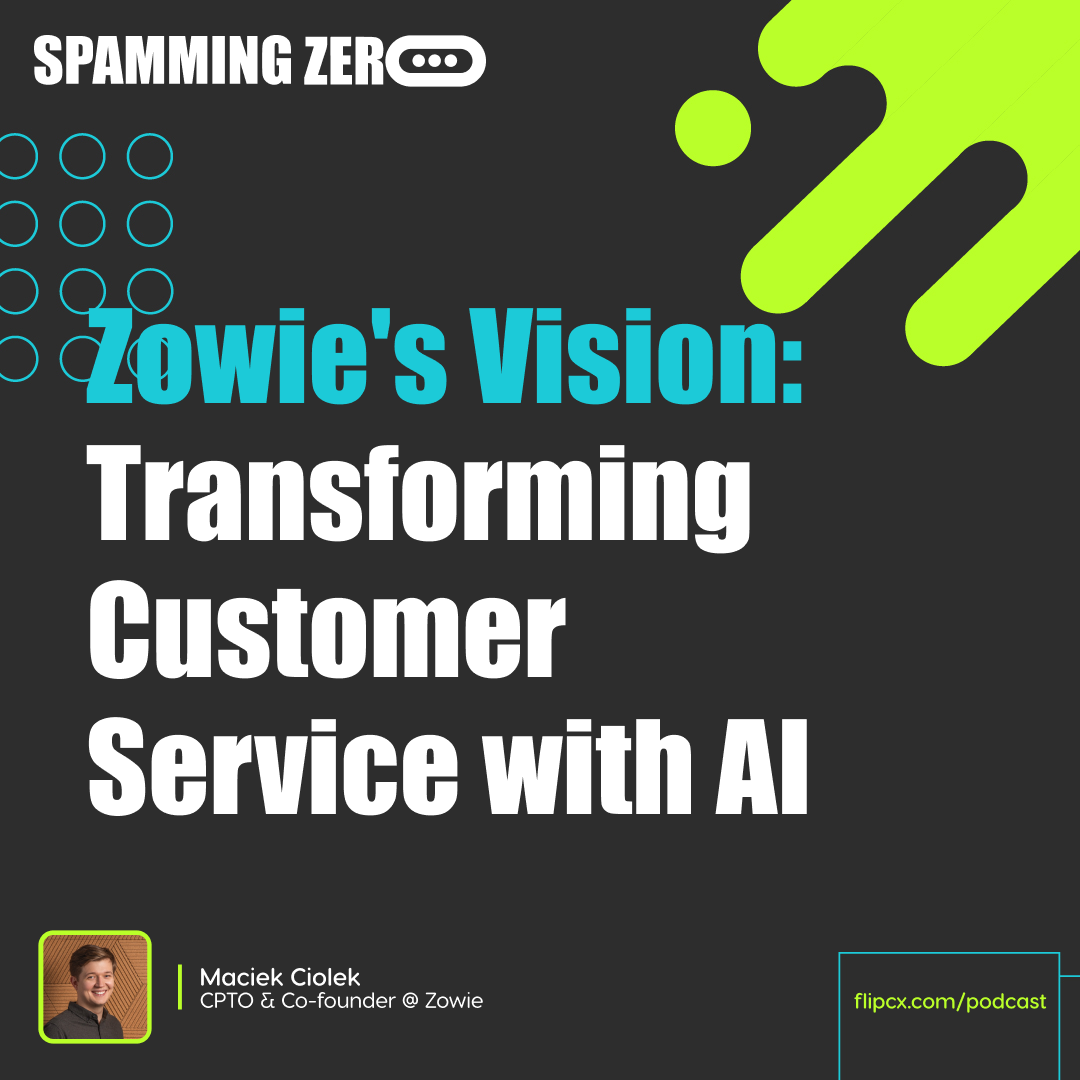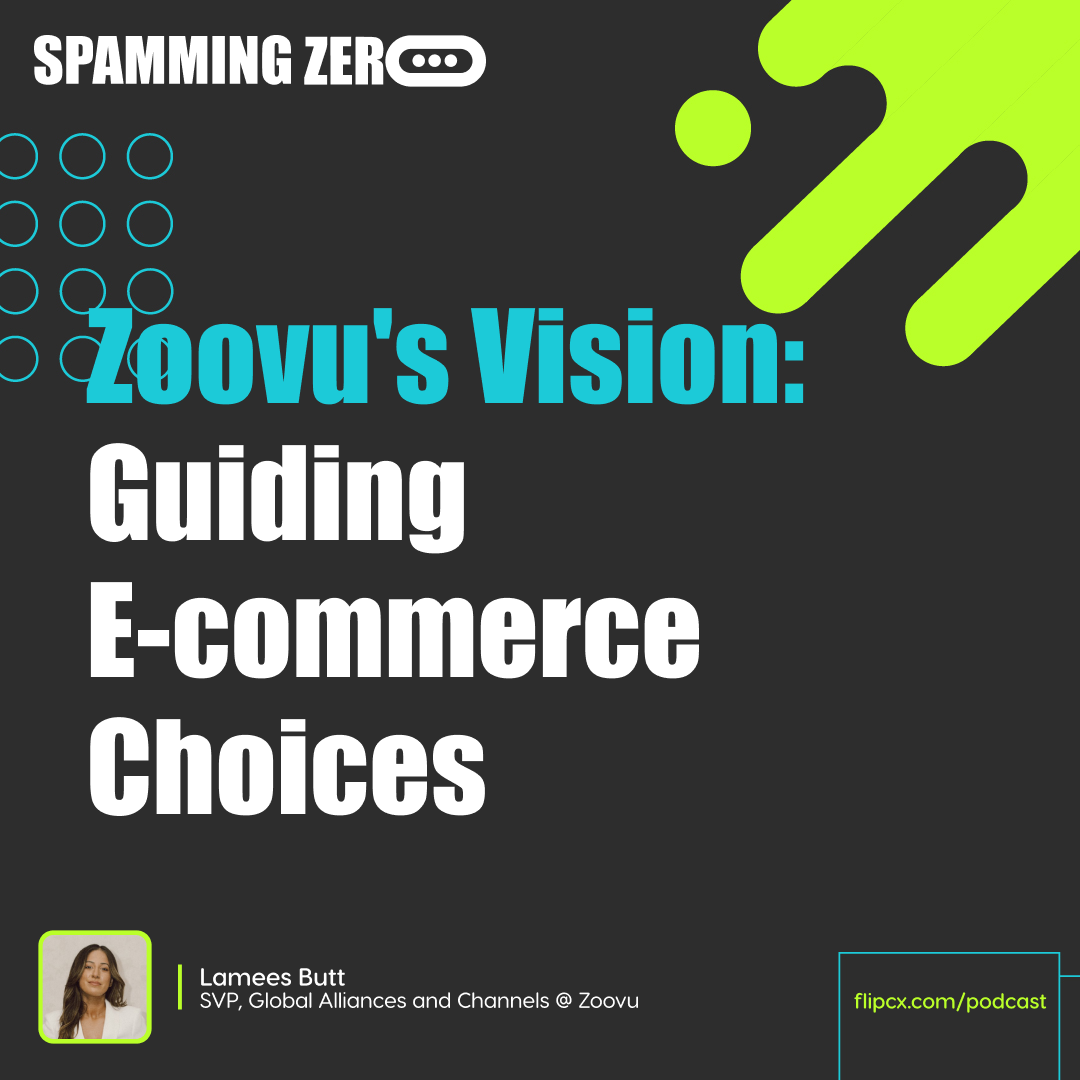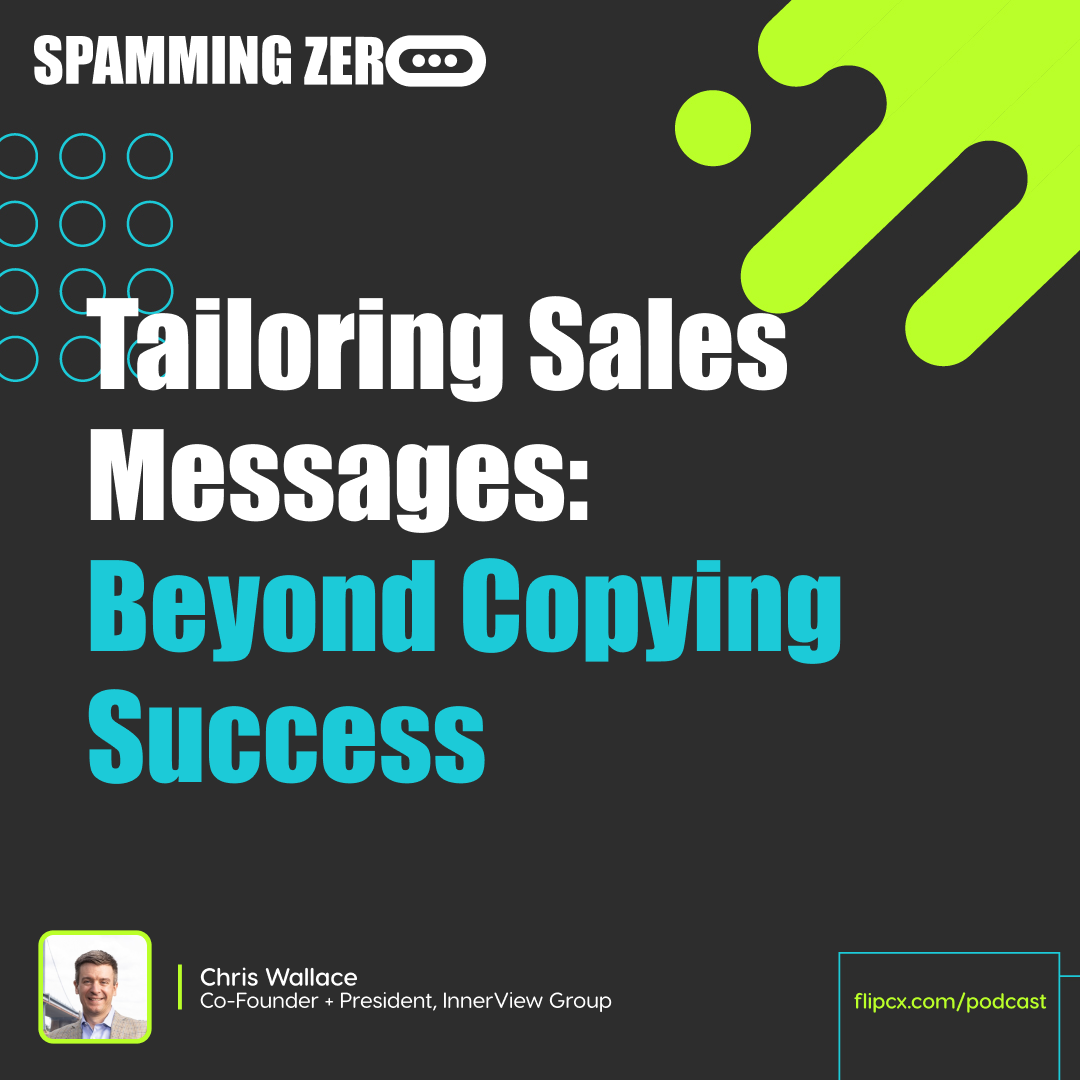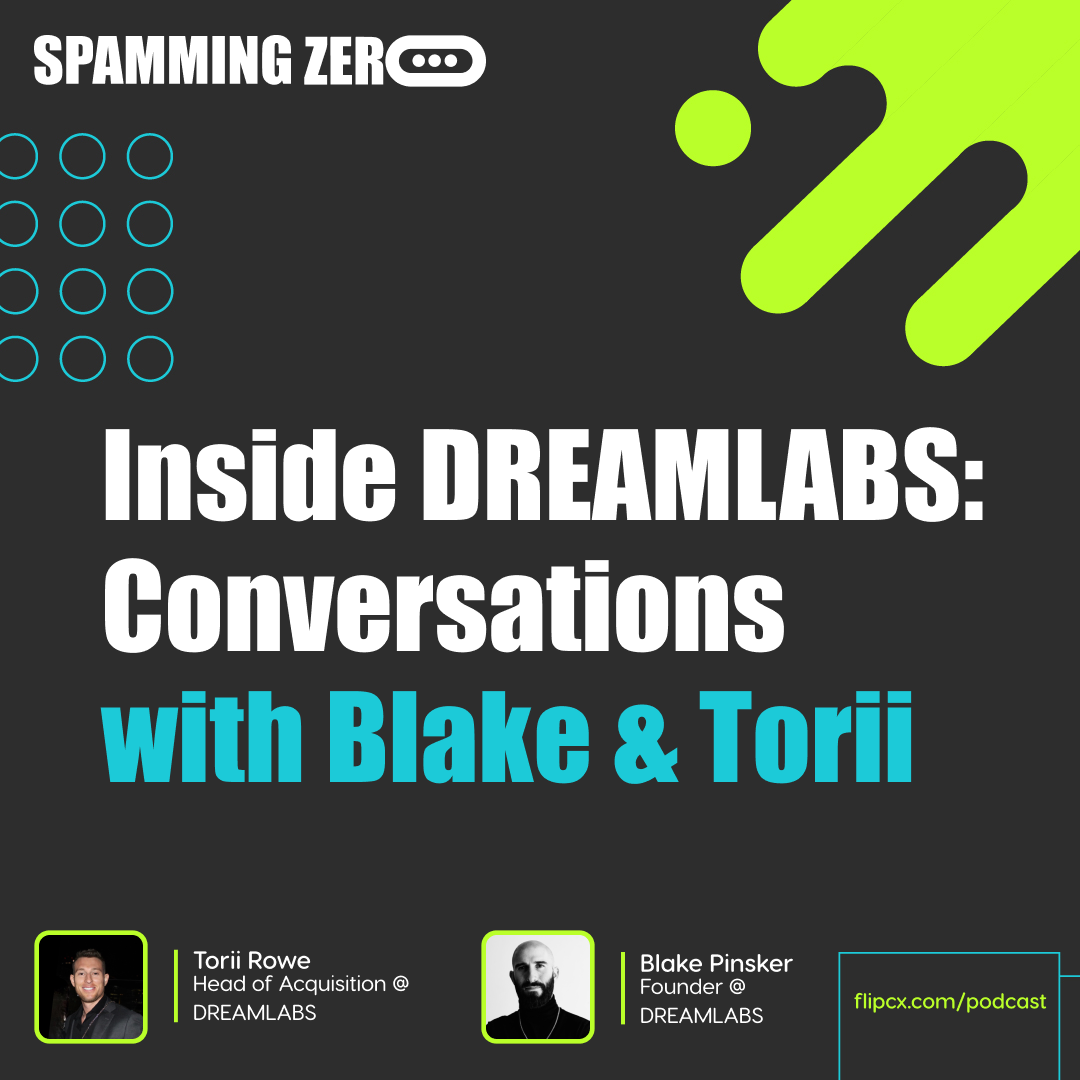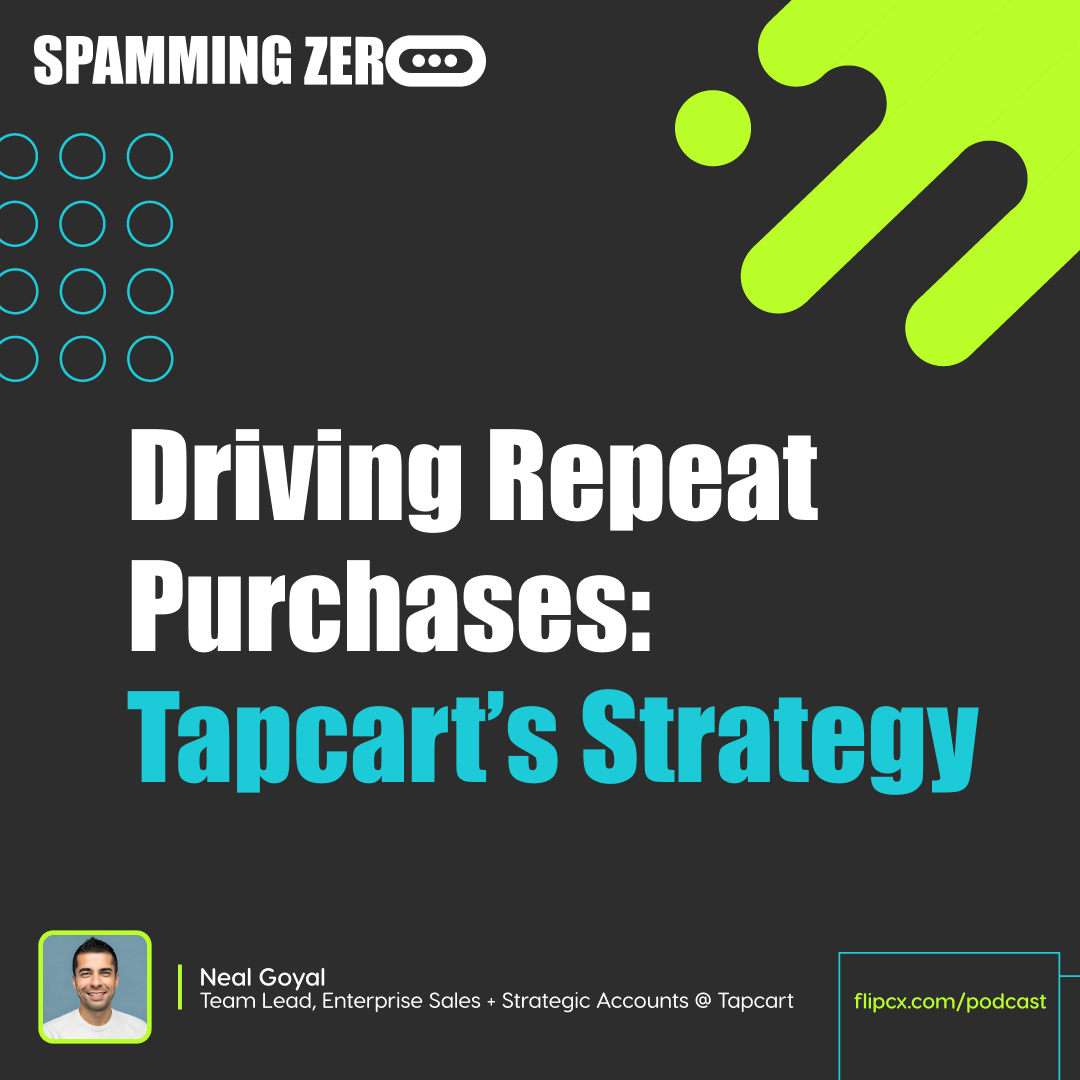Episode 30: Funky Marketing
- 0.5
- 1
- 1.25
- 1.5
- 1.75
- 2
James Gilbert: Hey everybody. Welcome to another episode of Spamming Zero. We are going to be joined by Nemanja Zivkovic, he's the founder and CEO of Funky Marketing. Today we're going to be talking about lots of things related to marketing, doing things unconventionally, which is one of my favorite things because I like to do that as well. So let me tell you a little bit about Funky Marketing really quick. A company that combines research and strategy with creatives to help B2B tech companies develop demand for the way buyers buy now. B2B marketing done differently with a bit of funk. He's also the host of another podcast called Funky Marketing Show and co- founder of the NS Business Talks, a professional networking community gathering 700 business professionals in Novi Sad and a big founder of Motown, GTA and funky music in general. Nemanja has a decade of work in marketing and business development and advanced experience in creating successful marketing strategies, achieving goals, and building high performance teams for international and domestic clients for many industries and niches. Stay tuned for an awesome episode about marketing. Hey to all of our listeners out there, this month's sponsor of Spamming Zero is HiOperator. We had Liz Tsai who's their CEO on our podcast just a few weeks ago. If you haven't checked that out, make sure you do that, it's amazing. Great episode. We can talk about customer service agents. We talk about lifetime value. We talk about a lot. So who's HiOperator? I'm going to read directly from the website that HiOperator has. This is a beautiful statement. I love what Liz says here. " Customer service is a core pillar of most businesses. It's also one of the hardest parts of the business to scale. Hiring is time consuming. Training is time consuming and volume varies by season and documentation is constantly in flux." All true. Agree a hundred percent. " They started HiOperator to make delivering customer service easy. Our mission is to help companies deliver excellent, scalable customer service effortlessly. Our clients can focus on their products and services and their customers get a great experience when they need help. HiOperator provides a complete customer service as a service solution. Through the power of high operators, human plus AI technology, client conversations are handled faster and more accurately. The end result, they deliver amazing customer service making companies and their customers happy. That's why they exist." That came directly from Liz. Here's some other fundamental stuff that I really like that they do some value add here. So train us once we handle all the recruiting, hiring and training moving forward, never have to deal with another classroom retaining or head count headaches... They say this, send us conversations, send us tickets. We pull the tickets automatically from your preferred CRM and then you have full control over how and when those tickets are used. Another one. Paper resolution. This is something we do at Flip as well. Charge for the conversation that we actually solve. No onboarding fees, no hourly rates. Pay for what you use. This is HiOperator, they're this month's sponsor. I'm James.
Brian Schiff: And I'm Brian.
James Gilbert: And this is Spamming Zero.
Brian Schiff: Welcome to the show, Nemanja. Thank you for joining us.
Nemanja Zivkovic: Hey guys.
James Gilbert: Nemanja, we like to do, we're very unconventional on this podcast, which is kind of actually what we want to talk about today when it comes to marketing. That's something that I'm a big believer in and being unconventional and don't do the traditional stuff that everyone is doing otherwise you're just part of the noise. So let's start with first of all, you run a company called Funky Marketing. Talk to us a little bit about it. Talk to us a little bit about why you decided to lean all the way in to Funky Marketing.
Nemanja Zivkovic: It all started with, I think with my background, which is in informal education, working with you, those kind of stuff. When I learned to kind of focus on the value and then the money will follow and it was hard then to turn things around, but when I actually turned them around then I realized I can sell anything and then it gets easier. So I specialize in performance marketing being on that side of the thing and it was always like automation works while you sleep. But what I found out it another truth and it is that it works also until you have the budget, right? Until you have the money. When you don't have the money, doesn't work, then you need grants, then you need content, then you need other stuff so after working in multiple agencies and involving startups in different roles, basically I funded Funky Marketing to do something on my own and to basically try to get marketing to where it belongs when people are actually doing marketing and marketing is doing what it should be doing. Basically where we are now at the point where we can say that we focus on strategy and research and add creativity to death to help B2B tech companies create demand for the way B2B buyers buy now, which is a lot different from what I just told you that I found out in 2019 and 2020. It all changed in scope of three years. I think internet matured and now the way we buy has changed and so I help companies realize that, figure out how to measure, how to differentiate and how to actually create demands for their products and services.
James Gilbert: You just unpacked a very important thing that I think people oftentimes get caught in this trap of doing things the same way they've always been done because they get caught in that trap because it's what worked and they hear about it and they hear other people that it's worked for them and so we're going to try that, right? But oftentimes they're already a year too late or maybe even two years too late. And marketing changes so much that you have to be dynamic. And that's what I love that you said is you've learned one thing when you were doing your research and talking to all these people and then realize wow, we have to actually shift and change it a little bit because that's not going to work anymore. B2B marketing, it needs to learn from some of the things that have worked historically for B2C and oftentimes they're just seen as two completely different worlds and I love that because I do think that it changes too often for us to get stuck into the mentality of doing things just to do them and I want to talk a little bit about some of the maybe unique ideas that you and your team have come to the surface with for companies and maybe some results that you've seen. Give us some of those ideas. Talk to us about what you've seen that's been more of the funky side of marketing work.
Nemanja Zivkovic: Yeah, I'll give you one which is quite simple that we did for ourselves first. And it's kind of interesting. By the end of the first year, five of us from the company, we were all over LinkedIn generating I think in that year like 50 millions impressions from all our profiles together and we told the LinkedIn influencers those kind of lists we are nowhere near and it's not only the impressions, we actually closed a lot of companies, a lot of accounts. And the thing that we say, okay, instead of writing a post how lists are shit, let's create our own list. So we created the funky list. I asked people from our company, who are the 10 people from LinkedIn that you are following that are giving you value? And then I used the average and we got around I think 20 people who were on the Funky Marketing list. We published the list. So a lot of them actually edit on their profiles like Funky Marketing influencer or something like that. I don't know what it was but we have done the podcast episode with them. That was the start of the Funky Marketing Show, the podcast. We then use that content to establish relationships with them and then it was basically the source of the content for the whole year'cause we did articles, we did video, we did audio, we got to chop it up into three to eight smaller pieces than some visuals. And basically I like to say that things are always more simpler than we think and we can get repurpose them until the end of time. And that was the starting foundation for a lot of things because it showed us how we can do some of the stuff also for the clients. One of the examples that I can say is the FinTech company. Here, one of the biggest in Serbia like FinTech you know how is the stiff industry? You cannot do everything. Very-
James Gilbert: Regulated.
Nemanja Zivkovic: Yeah, you need to have strict yes and strict no and you can operate in between. So for that company we found out that in between are the CEO's channel and the CMOs channel. Actually it was the same person who was the CEO and CMO kind of. So we said let's bring their personality and showcase it on LinkedIn with their profiles and then kind of get distraction. They had one company which is a portal, financial portal and the other one was the B2B air product, ERP. So we basically, by growing their personal brands, we managed to get the customers for both companies and some of them went really viral. When I say viral I mean three to five million people from Serbia have seen it, meaning Serbia has like seven million people. So it was in Serbia and so that's why I know that those are people from Serbia and it was totally different. Like COO was, we asked the COO, it was a lady, we asked her, what do you do? She said, " I'm the fucking octopus. You should write that in my beer." So we actually added COO and in the brackets, chief octopus officer, those kind of things and the CEO was the guy who had a huge PR background. He's known for being on the TV and talking about giving people financial advices so we used those things, added more and just distributed on his profile on YouTube, his LinkedIn show as YouTube shorts and he just blew up. He started to go then on the podcast, on the business podcast and so on and so on and people started to talk also about that B2B product that was kind of in a back'cause they were always behind like oh we need feedback, we need this feature, we need this feature. But then people started to dig about them and the product got in the front and actually they ended up, I found out that a month ago they ended up selling up one company and now they're building the product up. So the portal they got, they sold it. So it's kind of interesting. And also there was a thing where we went fully ironic. So I'm hustling hard when I wake up, I work with Australia, then I work with New Zealand, then I start working from Serbia and India. Then in the afternoon I work with US. One other example that I want to go through is a huge company, one of the unicorn now going almost pre IPO and going to the IPO or to be sold tech development company called HTEC Group and basically when we got into the company, they got to us inbound so we were doing a couple of things I'll explain, but the main thing was that they were looking at Accenture. Accenture is the leader in the space company with, I don't know a hundred thousand people, I think 110, 000 people working for them. And I'm mentioning them because all of those companies are measuring the success by how many people they have working inside the companies. So when I started working with them it was 300 people. In four months there were 800 people. That's the speed they were growing with. What the thing was that they were trying to copy Accenture and to do what Accenture is doing now when they're smaller, more flexible and they can go try out things and actually be different by being more flexible and so we implemented that through the content work with the CEO, the CMO and the team established early some of the basics of the content. Now they have their own marketing team and the content. One thing that we have done, we educated the call marketing sales, C level and also some of the engineers who were the team leaders about LinkedIn. So how to build a personal brand and how to implement that brand inside the employer brand and it got them the huge results. They were focusing only on that, it got them the growth of like 800 people'cause now basically there's a joke on LinkedIn that everybody like 80% of the people that you see in the field from that industry are working in HTech. It's kind of funny but that's how it goes. And the thing is what I want to emphasize, the CMO was the guy who actually knew what he was doing and we got the nice fit. He recognized us as somebody who can help him from the start, just generate the foundation and set up everything for success. He has one strategy which is open the new market every month no matter how small it is, no matter if those people have job because they had the funding and they're still doing it. And that's one thing that gets them going. I mean we work with, now I think around 70 companies in a short period of time so there a lot of stuff that I can say. Some of those I think that I can mention User Guiding one of the top 10 startups from Turkey. Basically we help them find out they were looking for who for which category they should rank for'cause they're onboarding tool but there are also no codes tool. They're project management tool. People are using it for different purposes and they were like we lost watchers, we focus on which category are we under? So luckily they were recording conversations like the customer success which having conversation with the customers but also the product team from different sites. And what we found out just by listening to the calls and getting research and into those things is that they can rank for all those categories. They are typing six or seven different things when they look for them. So basically the conclusion was let's build the media company and dominate all the categories. Why should we go just for one? And basically it was the hard work. I think we were writing 50 articles per month at once. There's the whole different thing'cause we were using even the AI combined with the research, we all different kind of stuff, but it allowed them to grow. Now they're in, I think, in top five in the majority view of categories that they're going after in most of them top three or even number one. And the thing is it helps them now gather the, it was a series A, now they're gathering the series B. Now they are close to, I think, maybe I'm wrong, but I think it's around two million in revenue. So growing really well, coming from Turkey going to the US and also what turns out is to be that not only US but the South America market is great for them so a lot of different stuff that we were doing and it helped us actually position to what and got to what we are doing now, which is kind of a little bit different. We are not doing all those different stuff but just focusing on setting up the metrics, creating sort of, I think we can go and use Chris Walker as a reference sort of like R& D department'cause we are coming with hypothesis, proving them if they're right or wrong after we figure out how we are closing demand and basically just one by one we are working to make it right and then we go to the next one and that's how we develop the company from the marketing side and affecting the revenue.
James Gilbert: One of the first examples you gave, which I love is this sort of value add first approach. So you went out and you found these influencers and a lot of these influencers probably didn't necessarily need you to give them a shout out. They probably didn't need it because they're already an influencer but you did it anyway and I totally understand why you did. You provide value first to get them to potentially give you value back. And from that then you were able to turn them into podcast guests which then turned into a whole slew of content that you were able to do with these influencers which just amplifies your brand and your agency. This has historically worked fantastically well and it's a very unconventional approach because not a lot of people do this.
Nemanja Zivkovic: Yes-
James Gilbert: inaudible approach.
Nemanja Zivkovic: ...just to give you one step before that is before we got into that, I didn't know where I was and where we was compared to knowledge and experience to some of the most experienced and people who are on top of LinkedIn based where we want to be. So I invited them to learn the background stories and the first 10 episode they have ever recorded were interviews when I listen and I see aha, can I talk about these things? Have I actually done some of those things? Was the background is the similar or no? And after the 10th episodes I actually started discussing with them on the same level and leave of the whole thing. That's where I was like okay, I can actually talk on the same level with those people.
James Gilbert: Brian is one of those rare CEOs that believes in the unconventional approaches things in a very unconventional way when it comes to marketing. So I'd love Brian for you to put your CEO hat on for a second and talk about it from your perspective on what it's like to do unconventional marketing and some of the things you've seen work.
Brian Schiff: Well there are two things that are kind of coming to mind here. The first, I remember when we were going through our courtship process together, you and I James and we had closed our round of funding and we knew that getting a marketing leader into the organ, into the leadership team was priority number one and that really forced, it forced two things for me. It forced me to get very introspective around what the type of person was that we were looking for and then it also forced me to go out and have 50, 60, 70 conversations with marketing leaders. And one of the strong conclusions that I came to through that process was that the best marketers today and going forward are the ones that are very strong in data and creativity, which is very much so in line with you talking about your own strategy and some of the examples that you gave. So I think that that is kind of one line of thought that comes and then on the LinkedIn piece of it, I would say that I didn't really have any choice. I had kind of decided that James was the guy and James had some terms of engagement for coming on and one of those terms of engagement was being active on LinkedIn and doing this podcast as well and-
James Gilbert: I think there was even a point Brian, where I said I can't take this role and we're not going to be successful unless you, and at least one other founder is posting at least once a week on LinkedIn. And inaudible.
Brian Schiff: I think that your initial bargaining position was once a day.
James Gilbert: It was inaudible.
Brian Schiff: inaudible and then I came back to you and I was like I can commit to once a week but it's like I wouldn't have done it unless I also kind of thought about it and thought that it made sense and did come to that conclusion and then it doesn't take long to kick in. It's like LinkedIn is one of those places where it feels like there are way more people that are on the platform in consuming content than there are creating content and there are more and more people that are contributing content every day but it still feels like a huge imbalance and relatively quickly there are just nuggets and those anecdotes. We talk all the time about, there's so much data out there that's at our fingertips for how the things that we're doing are performing and we need to understand all of that data but we also need to understand the limitations of that data. And part of what fills the gaps for the limitations of the data is the anecdotal stuff that you hear and it's like right, so- and- so mentioned something on a sales call or a DM comes in from somebody in the industry and all of those sorts of things. So I've certainly been fully converted into a believer and I'm on the ride.
James Gilbert: I want to bring this kind of full circle back to some of... And of really this podcast which is kind of driving the experience that people have with brands and some chalk that up to the customer experience, some just chalk it up to brand but ultimately it all boils down to creating a good environment that you can publicly put out there to the world and also something that the business itself can benefit from. And Nemanja, I want to ask you just a couple of quick questions to draw this in because I'd love to get your thoughts on some of this. There is a massive amount of automation that exists today and probably to a point where sales and marketing have probably over automated processes and communication to the point where it's saturated the market, where buyers like myself and others just are so sick of it. But automation in very specific areas still works incredibly well when it comes to marketing and there's also a notion on the customer experience side and the support side where automation is fearful for brands for that same reason they think it's going to get in the way. And I would love to get your thoughts. There are components of automation that are value add, there are components of automation that are not and I'd love to know where does your mind go when it comes to Funky Marketing on automation?
Nemanja Zivkovic: Yeah, it's a good question because I specialized in that. For two years I was focused on marketing automation, email marketing, website personalization. Even when you know automate how the website will transform based on where the person is coming from. Did they click the ad or they come through the email or they come through the social. We had a few tools that allow us to change the whole structure of the website, the hero photo, the hero story, the testimonials. They were all different based on that. And the thing is that when I see, especially now when I look at the like ABM and those kind of stuff is that people look as automation, as tools as something that creates the magic, right? We will just use the automation and it'll help us get the results but it doesn't work that way. You need to first do it manually on your own, test it out, see, find out what's actually working, then repeatingly do it until you get to the certain... Even you know can inaudible count it in the number of accounts that you close or you can count it in 1. 5 million in revenue or something like that coming through that channel or through that process and then you automate it. Then when you know that you know have all the perspectives in mind, you know all the things that can happen, you have everything, you saw everything, you eliminated all the things that can be an obstacle, then you automatically, then you move the building a second. So that's kind of the end process when you have everything finished and you add the automation to just keep doing what you have already proven that is working. From that side, yes. When I don't see it working very well is people abuse the automation and then look at it. I see so many people that messed up personalization and automatization, it's not the same thing. And sure, automation in most cases means even when I was working B2C means that it's not that I need to draw how you will buy from me, I need to draw the pattern and you will go through it and buy from me. That's not how it goes. I need to get to know the customers, find out all, go reverse engineering, find out how the buyer journey is going and then basically automation when we set it up is here to help people buy in their own way but we are making sure that they're finding the right stuff over there that will kind of create the relationship with them in every step of the journey. And automation can help us in that way. So we don't need, I don't know, 10 people to manage all of that, but we can have technology build in but before we get into that, we need to actually go to the process and do it on our own or dedicate a person who will do it for us. It doesn't matter.
James Gilbert: I want to call out something that you said too and that's the, you're right, automation is not personalization and personalization is not automation. But I also want to call out the fact that personalization isn't just high first name.
Nemanja Zivkovic: Changing the name. Yeah.
James Gilbert: That's not personalization. We've been kind of playing around a little bit with personalization as Brian knows here at Flip and one of the things that we do is we're a voice company. So we provide this Alexa- like experience for businesses. So why not personalize the voice, put our robot out there and actually leverage it. So we created these fun little videos where our robot is literally talking to these brands instead of it being me or Brian or Sam, it's our robot personalized talking to these accounts. That's personalization. It's not like, Hey Nemanja, same email for everyone else. That's not personalization. So I want to clarify that. And by the way, what you just unpacked for us with personalization and automation is also, it's relevant across B2B companies or B2C companies. I think B2C companies actually, in a lot of ways, probably do this more than they should. They automate thinking that it's a good thing and a good communication touchpoint where they probably needed to dive a little bit deeper in what the customer really wanted versus just sending that communication out. So I love the fact that you mentioned that.
Nemanja Zivkovic: When we talk about what the marketing does in B2C, where automation is much more present in that way, it is that marketing sells, right? In B2C marketing sales, you don't have a salesperson. In B2B, there is a salesperson but it's because marketing is not doing what marketing should do in that way and you mentioned the buyer's journey and the experience and everything else. You can use marketing to have the seamless experience when they buy, come to buy your product'cause it's technology and there's a lot of companies, a lot of similar products and buying experience is the one thing that can differentiate, like the thing that you mentioned with the voice, with the robots, those kind of things. And then also do you need to have three or four people that are creating, all of them are creating relationship, actually do all the marketing and BDR, then the AI comes to close the deal. The person that you don't know. So those kind of things, I think it's extremely important to have in mind and to focus on the buyer, how would they feel that we are different and how that different is good for them.
James Gilbert: We always like to ask our guests, Nemanja a couple of weird, off the wall questions that have nothing to do with the topic so we're going to do that now. We talk a lot on this podcast about really amazing experiences that people have or really bad ones. So I'd love for you to unpack an experience that you've recently had positive or bad with a brand. You don't necessarily have to mention the brand if you don't want to, but we're all about mentioning them if you inaudible.
Nemanja Zivkovic: Oh yeah, I can say one. I don't know if it's good or bad. I think it's mixed of both but I love the brand more because of the experience. I would say that I can name the brand, it's all good'cause I did all the commenting in public so it's Metadata and I love their branding, how they're different, how they're communicating but one message was I was showing in my feed every single morning when I wake up for three months or even more and I was like, I'm working on those stuff as well. So you know, I know that they don't look at the frequency and I'm like, I wrote a comment. " Guys, maybe you want to check the frequency of this one, I'm seeing it every morning." You know? Nobody answer because they don't look at the comments on the ads. So after a couple of months they hear a post and somebody or somebody else hear a post about the frequency and those kind of things. And I said, " Man, I still seeing the ad, that is funny." So I mentioned them, it hasn't,'cause they were an example of Metadata is a good one. I said, " Look, they're great, but maybe they can start thinking about the frequency." So they answered. It was like, "Sorry, we just saw it, now its fixed." You know, like that? And then I basically screen shotted it and I added it as a post and I gave the background story and everything and what's funny thing is that the CMO, the name is not on my mind, right now.
James Gilbert: Jason?
Nemanja Zivkovic: No Jason or it was the other guy, doesn't matter, but one of them had the comment inaudible and the crying thing, it happens, we fucked up. Sometimes we forget about things. We are humans, those kind of stuff and the whole team of Metadata came to the post, engage, share all different stuff and it's kind of like the hug at the end. It felt like that and they created that thing. It wasn't me. I just saw some of the things that bother me. I reached out and they go, went all the way to create that kind of experience about the simple thing that they forgot to look for.
James Gilbert: I have a very similar experience with Drift. Drift was showing me the top five CMO guide or something like that for, I'm not kidding you, I was getting this thing for four or five years. Same ad.
Brian Schiff: It is one of those things that makes you think that they're just like, like the company's just not really on top of what they're doing.
Nemanja Zivkovic: Exactly.
James Gilbert: I don't even know if I would chalk it up to that. I would say more so they're looking at the vanity metrics more than they're looking at the things that probably really matter. Just looking at Brian, I just sent you some stuff yesterday on what I would consider vanity metrics, but they're a pulse of being able to see how well is this performing based on industry standard and I think more often than not, the paid realm of a marketing gets caught into that and looking at those vanity metrics of what is our cost per click? What is our impressions look like on these ads? All that matters in the grand scheme of things and the aggregate, ultimately if it's not actually converting people. And sometimes it's tough to tie the attribution back to that exact ad, which is probably why Drift and Metadata got caught in that.
Nemanja Zivkovic: But let me-
James Gilbert: inaudible.
Nemanja Zivkovic: ...give you just a different perspective on the Drift'cause I have a positive experience with them. 'Cause back in the days when they created the category, right, conversational marketing, they published a book. Actually it's a conversational thing if they created the category or they did something else but anyway, that's how it was presented. We bought a book, I was the director of operation in the agency, the CEO bought a book and the thing is they shipped it out to Serbia all the way from the US and the two weeks after that, the postman came and he said, " There is one more package, one more book for you from Drift." Said we didn't order anything and it was actually a gift that they sent to everybody who bought conversational marketing and it was things that don't scale. A small book of 40 things that they have done to build a hyper growth company. It's the book that I gave to every new employee that came to the agency to look at so they can start thinking and start seeing the big picture.
James Gilbert: I like that.
Nemanja Zivkovic: And then I thought that's the value. When nobody expects anything from you, you just give them additional value and it's something that actually help you build your company.
James Gilbert: What a great way to end the podcast.
Brian Schiff: That's awesome.
James Gilbert: Nemanja, thank you so much for joining the Spamming Zero podcast today.
Nemanja Zivkovic: Thank you guys for inviting me. It was a pleasure.
James Gilbert: Thank you, sir. Don't forget to subscribe. Every week we have one of these episodes and stay tuned because we got some big surprises in 2023 that you're going to love. So stay tuned for that and we'll see you each and every week. Thanks for joining us.
DESCRIPTION
It’s a fresh new year! No better time to add a little unconventional thinking to your marketing strategy - and no better source for top tips in that department than Nemanja Zivkovic, CEO and Founder of Funky Marketing.
He sat down with Brian Schiff and James Gilbert to share what going funky has done for his career and what it can do for all you orgs out there - this week, on Flip’s Spamming Zero Podcast.
What’s Covered?
- Why Nemanja decided to lean all the way into funky marketing
- The trap of doing things the way they’ve always been done
- Unique ideas Nemanja has brought to the table + results seen
- Keeping things simple & repurposing content
- The value-add-first approach
- Data + Creativity = killer combo
- Nemanja’s thoughts around automation in marketing
- And more
Ready for more fantastic Spamming Zero conversations ahead? Listen, rate, and subscribe on Casted, Apple Podcast, or Google podcasts.
Today's Host
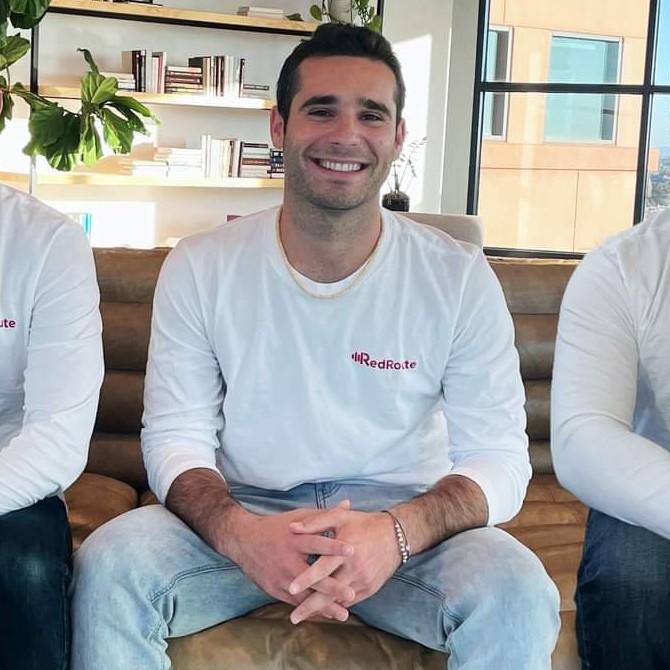
Brian Schiff
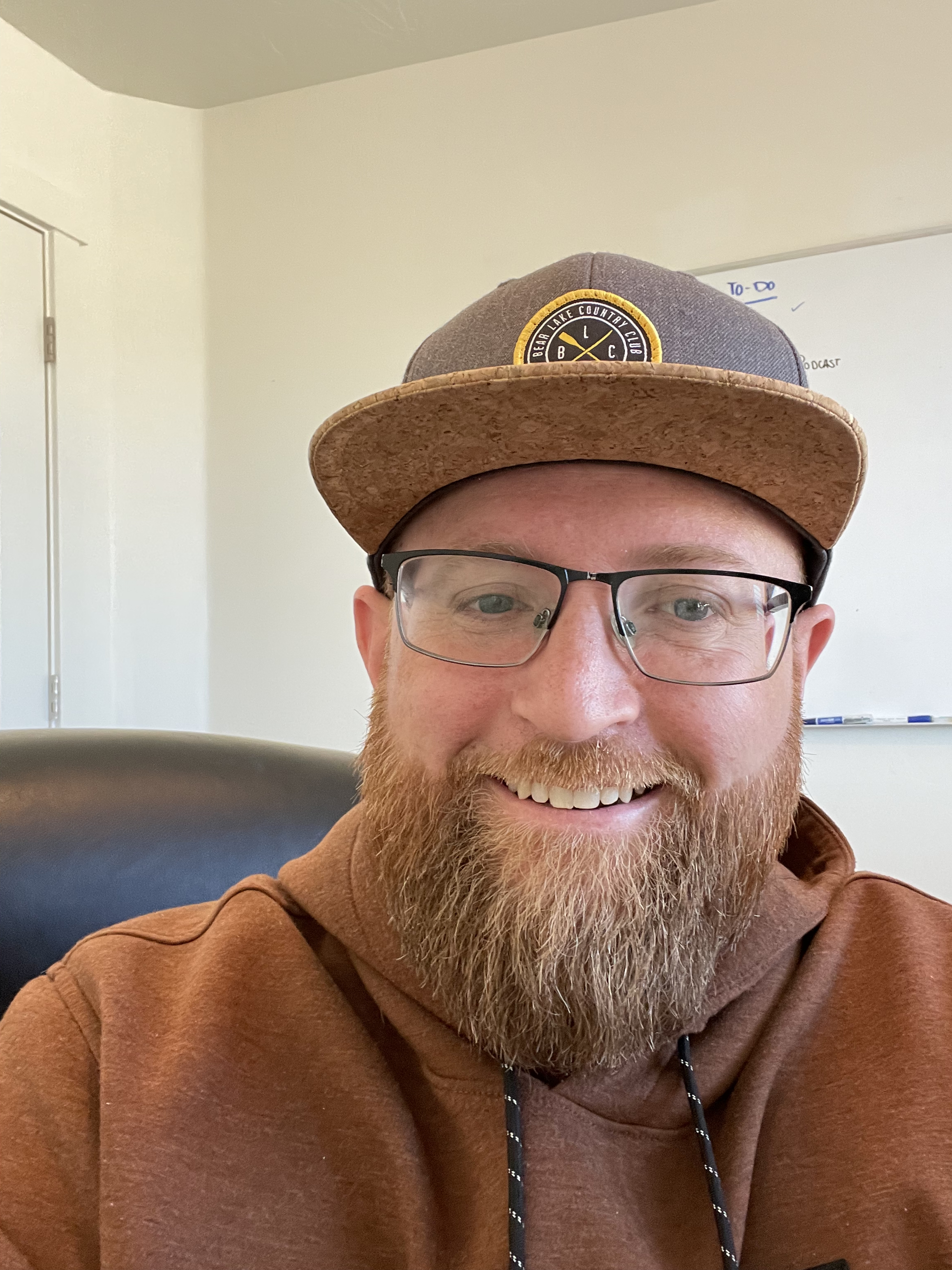
James Gilbert
Today's Guests

